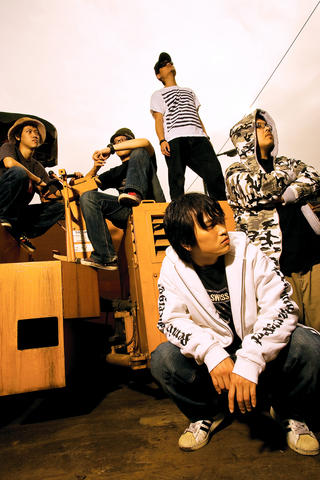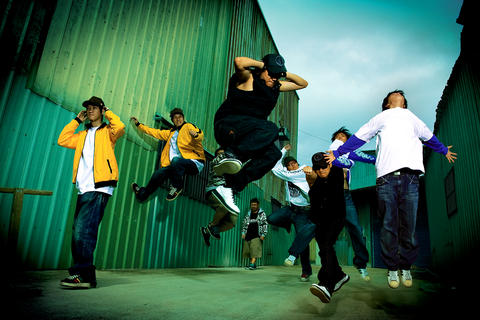Baggy pants, baseball caps and camouflage hoodies. This is the staple garb for local hip-hop kids and aspiring rappers who try to act like North American ghetto artists. Not Kou Chou Ching (拷秋勤). To the hip-hop crew whose members are all under 30, the Taiwanese genre is not an emulation, but a reconnection to their parents' music and Taiwanese roots, which include beiguan (北管), nanguan (南管), Hakka bayin (客家八音), mountain songs (山歌), Taiwanese opera, folk songs and oldies from the 1940s to the 1970s.
"We like to work with musicians such as Chang Jui-chuan (張睿銓) [a local hip-hop artist who raps about political issues]. We can't really go to a rapper who sings 'put your hands up' or 'throw your bras up.' It just wouldn't be right," said Fan Chiang (范姜), one of the hip-hop outfit's rappers.
Kou Chou Ching was formed when Fan and fishLIN (www.myspace.com/fishlin) met at Lyricist Park in 2003, a street rap circuit in Eminem's 8 Mile style. Their fun experiments with traditional Taiwanese music soon led to extensive research and the trawling of night markets and the Net for music.

PHOTO: COURTESY OF KOU CHOU CHING
The outfit honed a sharper sound when the young but seasoned DJ J-Chen, who specializes in scratching Chinese, Hoklo and Hakka tracks, joined the crew in 2004. Achino (阿雞) and Yobo (尤寶) came onboard later, adding an acoustic dimension to the crew's already distinctive style with their skills in the trumpet-like suona (嗩吶), bamboo flutes and other traditional instruments.
The band's name refers to the hard work of autumn harvesting. The crew views their brand of hip-hop as an extension of liam kua (唸歌), a grassroots Taiwanese performance art form that interweaves talking and singing, and dub their music as "traditional liam kua-style." Combining oral traditions with the Hoklo (河洛) language's inherent musicality, liam kua is an improvisatory way of telling stories that contain moral lessons, and thus is a fitting vehicle for the contemporary rappers to voice their observations on and critique of society. The strong link between lyrics and melody that mirrors Hoklo's tonal and musical qualities also makes the ancient folk art hip-hop-friendly.
"From the perspective of hip-hop music, Mandarin is too square to deliver punches and be expressive, because it has fewer tones than Hakka, Hoklo and Aboriginal languages," Fan said.

PHOTO: COURTESY OF KOU CHOU CHING
"My Chinese friends told me that among the hip-hop acts mushrooming in China, the best are always the ones that rap in dialects rather than Mandarin," fishLIN said.
In 2005, the group's five members put together their first release and EP record Fu-Ke (復刻) that instantly separated them from parrot rappers with it's eclectic range of musical styles and socially conscious and political content. They have regularly performed at art and music festivals such as Kungliao Ho-Hai-Yan Rock Festival (貢寮海洋音樂祭) and Spring Scream, but they feel most at home at small cultural events and temple celebrations held in villages and towns across the nation.
"Our music has a strong grassroots sensitivity, and we like to travel around to meet and talk to locals directly," said fishLIN, who said that the outfit's gigs at night clubs in Taipei aren't nearly as fulfilling since most of the audience "care more about how they appeal to the opposite sex than appreciating the music."
Though Kou Chou Ching has yet to become one of Taiwan' best-known bands, their music has long reached a global audience through the Web. Their use of MySpace.com has helped the band gain not only an international following and online media exposure, but also a gig in Tokyo and the input of MoShang, a South African musician working in Taichung who offered his artistry in mixing for their debut album Kou !! It's Coming Out !!! (拷!!出來了!!) that hit record shelves in December last year.
The critically acclaimed double CD features extensive samplings of traditional material including nanguan, Hakka bayin, Mountain Songs, jianghu tunes (江湖調) once sung by itinerant artists, and the old folk number Three Peach Song (三桃調), which originated in Chishan (旗山), Kaohsiung County. The CD features tributes to legendary figures such as Chen Da (陳達) and Huang Ke-lin (黃克林) as well as the protest band Labor Exchange (交工樂隊).The rappers also collaborated with young musicians from diverse backgrounds such as R 'n' B band Quest of Soul, musician Li Yu-lun (李育倫) and Hakka vocalist Lin Bi-hsia (林碧霞).
For Fan, however, the first CD couldn't be completed until a second disc was made that featured Kou Chou Ching's music rearranged to further explore their equally talented peers - Lim Giong (林強), Monbaza and DJ Jay Szu.
"The double CD set presents the concept of time and continuity, from the past, present to future developments and possibilities," said Fan.
To the young rappers, inspiration came from wide ranging sources such as the news about a historical building about to be torn down, the sight of polluted oceans and even a chat about a mountain ogre (魔神仔) that fishLIN had with a villager after a gig at Spring Scream.
"You can get so much from talking to people and picking up things you can't possibly learn from books or TV," fishLIN said.
Ideas may come easily, but translating them into music is a laborious process that involves field study and time-consuming research. If the young rappers want to write about pollution in the ocean, they go out to find evidence and documents to back up their views. If the group decides to sample a traditional tune, it's members first study the origin, history and development of the tune, since music needs structure, not a hodgepodge of cut-and-paste sections, to use fishLIN's words.
Such strict attitudes toward making music explains why Kou Chou Ching produce only two to three songs a year. The group has produced 30,000 words of bilingual notes to accompany the double CD set and an audio and written dissertation on what they have learned from the past four years.
As for their future plans, the rappers said they wouldn't confine themselves to hip-hop acts and are keen to experiment with different music styles.
"We have been thinking of doing a house music project in Mandarin, Hakka, Hoklo and Aboriginal languages … . If someone wants to try out Hakka R 'n' B, I am also interested," said Fan.
Check out the group's gig schedule at blog.roodo.com/kou. More information on Kou Chou Ching's is available at www.myspace.com/koucc and the outfit's official Web site at www.kou.com.tw.

Growing up in a rural, religious community in western Canada, Kyle McCarthy loved hockey, but once he came out at 19, he quit, convinced being openly gay and an active player was untenable. So the 32-year-old says he is “very surprised” by the runaway success of Heated Rivalry, a Canadian-made series about the romance between two closeted gay players in a sport that has historically made gay men feel unwelcome. Ben Baby, the 43-year-old commissioner of the Toronto Gay Hockey Association (TGHA), calls the success of the show — which has catapulted its young lead actors to stardom -- “shocking,” and says

The 2018 nine-in-one local elections were a wild ride that no one saw coming. Entering that year, the Chinese Nationalist Party (KMT) was demoralized and in disarray — and fearing an existential crisis. By the end of the year, the party was riding high and swept most of the country in a landslide, including toppling the Democratic Progressive Party (DPP) in their Kaohsiung stronghold. Could something like that happen again on the DPP side in this year’s nine-in-one elections? The short answer is not exactly; the conditions were very specific. However, it does illustrate how swiftly every assumption early in an

Inside an ordinary-looking townhouse on a narrow road in central Kaohsiung, Tsai A-li (蔡阿李) raised her three children alone for 15 years. As far as the children knew, their father was away working in the US. They were kept in the dark for as long as possible by their mother, for the truth was perhaps too sad and unjust for their young minds to bear. The family home of White Terror victim Ko Chi-hua (柯旗化) is now open to the public. Admission is free and it is just a short walk from the Kaohsiung train station. Walk two blocks south along Jhongshan

Jan. 19 to Jan. 25 In 1933, an all-star team of musicians and lyricists began shaping a new sound. The person who brought them together was Chen Chun-yu (陳君玉), head of Columbia Records’ arts department. Tasked with creating Taiwanese “pop music,” they released hit after hit that year, with Chen contributing lyrics to several of the songs himself. Many figures from that group, including composer Teng Yu-hsien (鄧雨賢), vocalist Chun-chun (純純, Sun-sun in Taiwanese) and lyricist Lee Lin-chiu (李臨秋) remain well-known today, particularly for the famous classic Longing for the Spring Breeze (望春風). Chen, however, is not a name